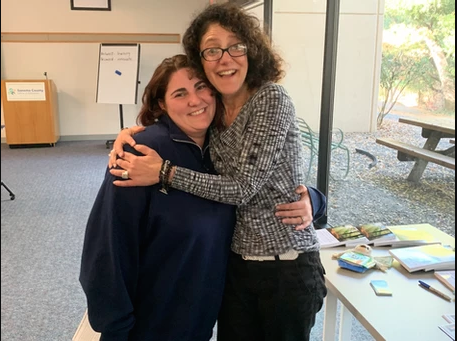2 More Tools to Add to Your Toolbox: Values and Acceptance
By Roy Eiermann, LCPC
Self-doubt. Guilt. Frustration. Anger.
These were more than just a fun Friday night for me when we had 5 kids running around. I really began to question my effectiveness as a father. I made tons of mistakes and questioned if the sacrifices were even worth it. It was more than just not being happy. I felt like a joy vampire had clamped onto my neck and was draining me dry. I doubted my effectiveness at work, at home, in my friendships, and in fatherhood.
Let me offer a little disclaimer: If you’re looking for a magic answer or a simple tool that will change everything, you can quit right here.
The changes I made were with the help of numerous tools, a variety of supports, and a whole lot of perseverance. My goal is to offer a couple of strategies that might aid you on your journey. I don’t suggest that this is the quick fix but another tool in your toolbox. And I don’t pretend to have it all together today. I’m still a work in progress.
Alright. Time to dive in. I’m going to start with asking you a lot of questions. (Don’t say I didn’t warn you.) Here we go!
- What are your values?
- What are you living for?
- What kind of person do you want to be?
I know I just listed three questions here but I would recommend stopping for a moment. Think about those questions. Dare I say it, maybe even get out a paper and pen and write about it? (Yeah, right. Like anyone has time for that.)
Values are the guiding principles in our lives. They’re the ideals for which we strive.
Common values could include being a good parent, providing for your family, always being there for those you love, and working hard at everything. Some other people might say their values are having fun, getting the most out of life, making lots of money, and traveling the world. I’m guessing you’re a little like me and align more with the first set of values rather than the second. (Although there is nothing wrong with valuing a little bit of fun now and then – just ask my kids about me and whip cream!)
So let me get serious for a second and ask:
- What are your values?
- What is important to you?
- And again, if you didn’t answer the questions before, here’s another chance to do it. Take a moment.
Once you identify your values, begin to identify how you live those out day-by-day and moment-to- moment. What does this look like for you? If you picked always being there for those you love, maybe it means spending an hour a day with your kids without any distractions. If you picked being kind to others, maybe it means doing one thing daily that demonstrates that kindness. If you picked being a good parent, maybe it means reading the extra story before bed tonight because you know how much your child loves it even when you’re exhausted. If you picked having fun, maybe it means having a whip cream war that spans the entire house when your kids only thought you were going to add a dab on top of their ice cream sundae. (Hehehe. I like chaos.)
Okay. I need to get serious again for a moment. Listening? Okay. The point of identifying your values and living them out more fully is not to put more pressure on you. The goal is not to identify how you’re not good enough. Are we clear on that?
You are doing enough. You are good enough. Are we in agreement with that? Okay. This is just an opportunity for you to make small steps on the road to keep getting better. Your values can be your compass on your journey. They continue to point you in the right direction, no matter what life throws at you.
Next, I want to address when other things get in the way of acting on your values. These could be your thoughts, feelings, urges, desires, bodily sensations, judgments, or impulses. They grab our attention and influence us to act in the ways we may not want to act. They influence us to do the things we may not want to do.
Let’s imagine that I set the goal to eat healthier. One day I come home to the smell of freshly baked cookies. There they are, sitting on the counter with steam still rising from them. They are baked to perfection: crispy on the edges and soft and gooey in the middle. (Geez I’m getting hungry.) Immediately I have the thought, ‘I’ve been really good all week. I’ll just have one.’ If I allow that thought to take control for the next few minutes, I’m not sticking to my goal of eating healthier. If my body were a car, I was no longer in the driver’s seat.
Let me make a couple of things clear: 1.) There is nothing wrong with having a cookie! And 2.) We are not helpless against our thoughts. The real question about the above situation is this: did I make a decision based on logical, thoughtful decision-making or did I make a decision based on impulse, urges, and immediate gratification? The answer is the latter and that’s the problem. How many times do we act on our thoughts, feelings, urges, desires, bodily sensations, judgments, or impulses? And how many times do we look back at that action and regret it? If we are able to s-l-o-w down just a little bit, we can realize the process while it’s happening. We can choose to interrupt it. We can choose to keep our hands on the wheel and tell our thoughts, feelings, urges, desires, bodily sensations, judgments, or impulses to remain in the passenger seat. And notice that I said ‘to remain in the passenger seat’ and not ‘leave the car.’ The unfortunate reality is that these knee-jerk feelings and behaviors often continue to be present for a little while, even when we don’t act on them. So while they are riding shotgun, what do you focus on? Your values and what’s important to you.
Once you’ve identified your values and are using strategies to keep thoughts and the rest (I’m not going to name them all again) from being in the driver’s seat, the next thing to do is to open your arms wide and embrace everything in your life with acceptance. I’m anticipating that some of you are raising your eyebrow so high, Dwayne The Rock Johnson would be proud. Yes, I said acceptance. But let me clarify:
- Acceptance does not mean being okay with everything.
- Acceptance does not mean liking everything.
- Acceptance is recognizing there are things that are out of your control and by acknowledging that and dropping the struggle, you experience less suffering.
I know this is not easy to swallow. It’s like I’ve handed you a giant horse pill without any water and said, “bottom’s up!” Mary Poppins and her spoon full of sugar is nowhere to be found. Sorry. But imagine this: I live in the suburbs of Chicago. Once upon a time I lived in the desert of Arizona and oh, how I loved it. Warm, sunny weather. Shorts and flip-flops 9 months out of the year. So why did I move back to Illinois? Don’t ask. Fact of the matter is, I chose to move back. Can I be mad that it is 20 degrees and snowing in the middle of January? Sure, I can be mad but what difference will that make? Can I go outside and scream at the sky? “DARN YOU SKY! WHY DO YOU HAVE TO BE COLD AND SNOWY IN JANUARY?!?!?” What will that change? What will be different? I’ll tell you: NOTHING. So what do I do? I open my arms wide and embrace good old Jack Frost. I made a promise to myself that my next car would have the Cold Weather Package: combination heated seats and steering wheel! I keep my garage organized and clean because I refuse to scrape another windshield covered in frost. And I waste more than just a couple of dollars preheating my car before climbing in. I’m not happy about the cold and snow but I’ve found ways to accommodate to it. I accept the nature (literally) of January in Chicago and find ways to power through it.
Sometimes that’s what we have to do with our families. If we accept the nature of our families, recognize the things we are unable to change and power through it, we may experience a little less struggle. Again, what I am suggesting is not easy. Trust me, I know. But I no longer get as frustrated expecting something from a family member when I know it’s not something they can deliver. I’ve tried to accept them even though I may not like a limitation.
As you can imagine, this has been a process for me. These are not simple tools that offer a quick fix. It takes time to incorporate them into your life and practice them on a daily basis. My hope is that by adding these tools to your toolbelt, it offers you a different perspective and a little less struggle with the challenges you’re facing.
These strategies, in addition to many others, are the garlic to scare off my joy vampire. Values help me keep what is important in view. I no longer doubt my effectiveness on a daily basis. I not only accept the mistakes I made in the past but also accept that I will make mistakes in the future. My sacrifices are worth it because I am living the life I want to live and becoming who I want to be. It isn’t about my kids and their behavior. It is about me being the kind of dad I know I want to be, regardless of how they respond to it, whip cream wars and all.
Roy Eiermann is a licensed clinical professional counselor in the state of Illinois and clinical director at OMNI Youth Services. He specializes in child and adolescent therapy, trauma-informed treatment, and substance abuse services. He can be reached through his website: https://meetmonarch.com/









